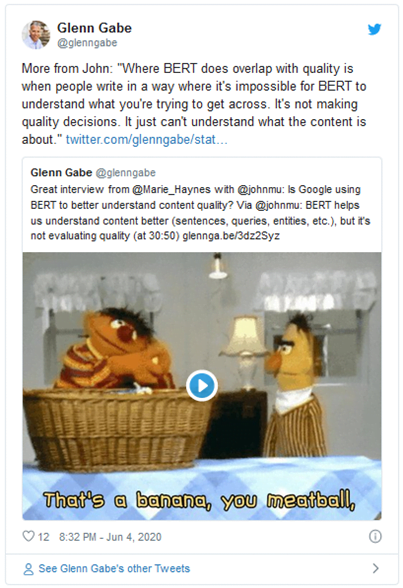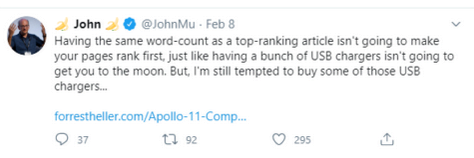This Is Why BERT Is Not Making Content Quality Decisions
- 9 June, 2020
- Jason Ferry
- SEO

In a recent interview with Marie Haynes, John Mueller provided SEO professionals and webmasters with an explanation of the real purpose of BERT when it comes to content.
Glenn Gabe also provided a summary for this in Twitter, saying that BERT is useful for the better understanding of content, but there's no intention that it will be used to assess that content's quality.
Here are Gabe's tweets:

In the podcast interview, Mueller said, "the one thing where people sometimes get thrown off is with regards to BERT, the BERT algorithms, all of those things. Those are essentially algorithms to understand content better. It's not so much to understand the quality of the content but more to understand what is this content about, what is this sentence about, what is this query about to figure out what are the different entities that might be involved here and how are they being tied in here".
This statement from Mueller is beneficial in that it helps the SEO UK community understand the major difference between typical quality algorithms and BERT.
What Is The Ideal Word Count For SEO?
Many publishers and site owners cite confusion about the number of words that they ideally need to create for meaningful content. Other factors people seem to give a backseat to the article's purpose, its content and the target audience. Overall, word count seems to be most people's main concern when it comes to SEO.
The Myth About Word Count
Many believe that the longer the content is, the better. If the page contains a lot of words, search engines are more likely to identify it as being authoritative, and hence award it a higher ranking.
There's no apparent factual basis for this, but nevertheless, the idea that longer content is better is still one of the most discussed topics on Twitter and forums generally. But why should people think that lengthy copy makes for more rank-worthy pages?
Misunderstanding Studies
Several studies have been quoted in relation to word count and SEO. One article published last April 2020 cited that the "average Google first page result contains 1,447 words".
Now, it's quite easy to consider this single statistic as gospel truth and assume that content requires at least 1,500 words to be able to rank at the top of the SERPs.
However, take note that this is not what the study is implying. Instead, it's stating that there is a commonality shared by high ranking pages.
This is not causation, but a correlation.
The Best Word Count For SEO
When it comes to determining the ideal word count for content, there are several factors, aside from ranking, that should be considered.
It's crucial to remember that the content must be written with human site visitors in mind, and not for the search bot.
The length of the content should be as long as necessary to make sure that page users will get the information they need. And that's regardless of whether it's a short description of a product, a simple answer to a question or an in-depth explanation of a topic.
Keep your users in mind when producing your copy.
What's Really The Best Word Count For SEO?
While many are concerned about their content's word count, the truth is that there's actually no set number for this. As noted, what really matters is whether the content provides a comprehensive answer to the user's query.
For users, the word count is rarely a deciding factor. They are more likely to look at the copy's quality, and whether it gives them the answer they're looking for. In other words, the quality of the copy is not defined by the volume of text.
Here's what John Mueller says about this:

There's also a similar notion that you should have as many words on your page as your highest-ranking competitor. Mueller has something to say about this as well:

Correlation and Causation
If you are researching the top five ranking pages for your selected search term and identify that all of them have at least 2,000 words, it's normal to assume this is what you should do as well. But it's really not.
The length of the text is not the deciding factor. Those contents might be more link-worthy and shareable, which is making them score more highly in the good rankings. Another reason could be that a lengthy content contains more accurate answers to address some queries, making them rank well on this count.
The point is, correlation does not equal causation.
So How Long Should Content Be?
As discussed above, it's not right to assume that the longer the content, the higher you'll rank. According to Google's SEO starter guide, "Content should be factually accurate, clearly written, and comprehensive".
Length is not synonymous with comprehensive. Comprehensive means "complete and including everything that is necessary".
This means that the content must be extensive enough to cover everything the searcher may be looking for. In some queries like "the history of the English monarchy", that could be a substantial number of words. In others like "gas prices near me", the volume of text might be less significant.
Can the copy be too lengthy?
The answer is yes. One problem with writing content to a specific length is that it can be diluted. Sometimes, writers even use the same ideas over and over again, or fill the article with padding just to reach the required volume of text. This is not recommended.
Doing that can definitely impact how the content will rank for the search terms you're targeting – negatively!
Diluting the copy's message may also lead to keyword theming of the page getting knocked off course, forcing you to write something that presents irrelevant ideas just to pad out the copy to a certain length.
This can badly impact your page's ability to rank for your chosen search terms. In short, stop striving for a certain word count, and instead focus on the purpose of your page.
The Page's Purpose
The purpose of the page should be a top concern when it comes to determining its ability to rank well in the organic SERPs. Determine whether your copy is meant to be informational, transactional or created to sign-post users to other pages on the website. Knowing its purpose is key to determining how much copy you need.
User intent
User intent is probably the most crucial factor for deciding on the length of your copy. If you know what the user is looking for or needs, then you can create copy that is comprehensive enough to fulfil their requirements.
Keep in mind that even if a page ranks well, rankings must not be your main goal in SEO. Converting traffic should be.
For instance, if a searcher is looking for an answer, but can't find it, then their needs are obviously not being met.
Conversion
Conversion is another factor to consider when determining your copy's length. Some pages don't need a great amount of content to meet a user's needs. For example, too many words might be off-putting in product categories.
In Summary: The Ideal Count
There's no best word count for SEO. The length of the content must not be dictated by an amount of text.
What you should consider is whether the copy contains the real purpose of the article, enabling users to do what they came for on that page.
While more lengthy content is an advantage in some SERPs, the word count is not the only factor to consider in ranking.
Make sure that your content meets the user's needs and opens the possibility of conversion, and there's no right word count for that.
These articles were sourced from https://www.seroundtable.com/google-bert-does-not-determine-content-quality-29574.html and https://www.searchenginejournal.com/what-is-the-best-word-count-for-seo/370655/. To view the full stories, head over to the links.
If you need help in producing quality content for your website, don't hesitate to work with the best SEO company around to get that done. Find out more about our services by visiting Position1SEO.















